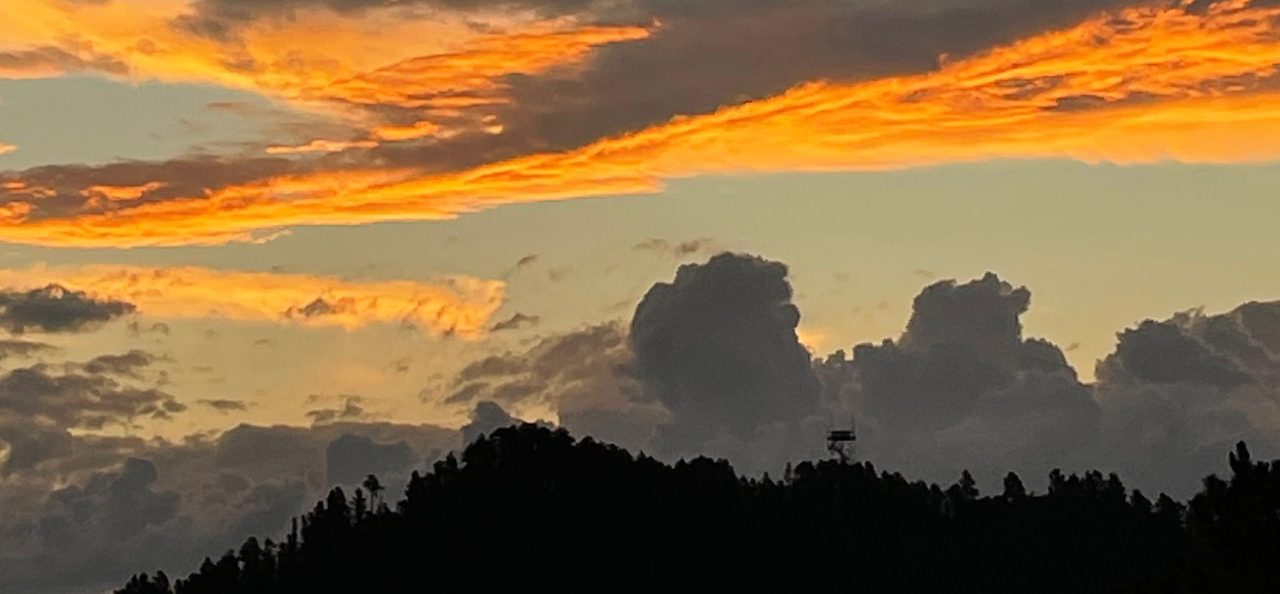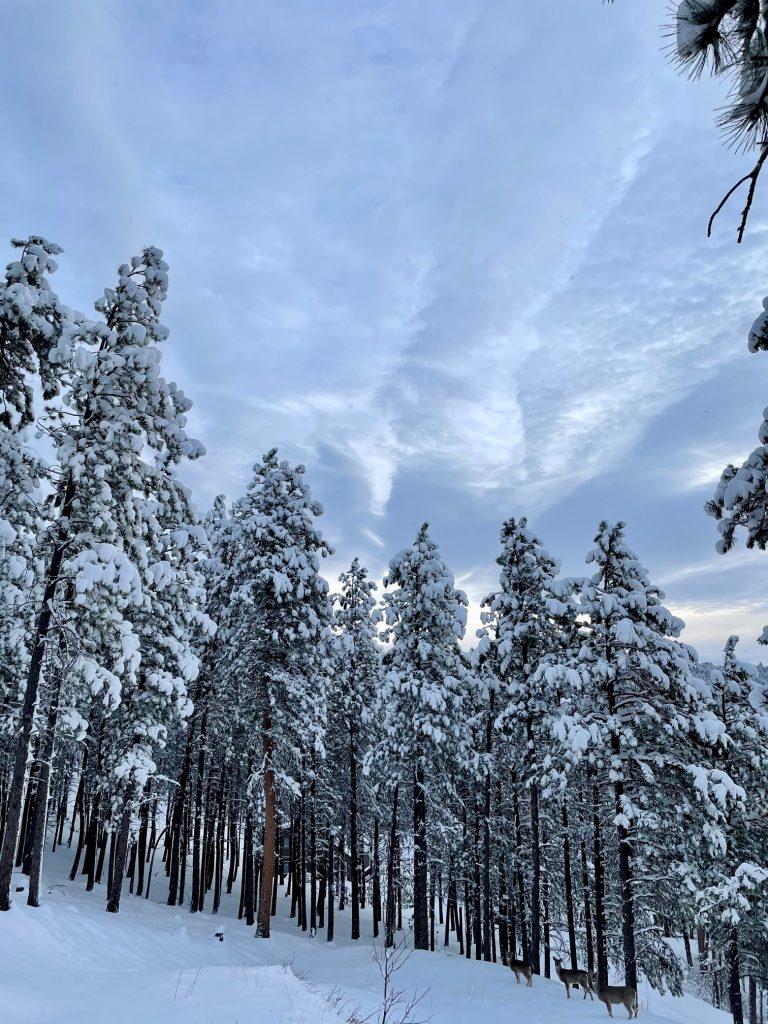A Little Slice of Heaven

My chainsaw is little. Like, really little. A baby chainsaw. The love child of gas-powered monsters that guys twice my size use to slice through the trunk of a 200-year pine as if it were a stick of butter. Those blades are as long as my leg. This blade, the one on my chainsaw, is as long as my forearm. It’s a DeWalt. The DCCS620. Yellow and black and powered by a 5V or 6V battery that we keep on a charger in our laundry room, right next to my ironing board.
Today, I will get some wood to add to our woodpile that we will burn in our wood burning stove that’s tucked into the mouth of a stone fireplace. My hubs, Bryan, and I are living in the mountainous boonies of South Dakota. Seven miles of dirt and gravel away from the nearest two lanes of asphalt, a road less traveled until the tourists descend in the summertime. They will drive slow enough to admire every pine in the National Forest that surrounds us, unleash their screaming brood in the driveway of their vacation rentals, and further shatter the tranquility of God’s creation with their ATV’s, UTV’s and RV’s, leaving a trail of empty beer cans and Little Debbie wrappers wherever they go.
My objective today involves my chainsaw and wood. A lot of it. As much as I can stuff into the back of the Jeep. The more wood we can burn, the lower the bill for our electric heat and that means more money to save for an early retirement.

There is a language associated with cutting wood that goes something like this:
Statement: “Saw a good pile of sticks on that slash pile. Nothing looked punky. I’ll go chunk ‘em, throw ‘em in the bed, and then put ‘em through the splitter so we can stack ‘em. I hope I have enough juice to get a full load before some (blankety blank blank) steals them.”
Translation: “I found a good pile of timber that the forest rangers must have cut and stacked last year, because the wood looks seasoned and not rotten and will therefore burn well. I’m going to take the chainsaw and cut each piece of timber into smaller pieces to make them more manageable, load them into the bed of the truck, and then run them through the log splitter so that they can continue to dry after being neatly stacked. I hope my batteries last long enough for me to get a full truck load’s worth, because it’s good wood and someone else will surely take it.”
Slash piles are massive piles of discarded timber. In the Black Hills, it’s yours for the taking after you buy a ticket book from the Forest Department that allows you to take so many cords. Each ticket represents one cord of wood, and each cord costs five bucks. It’s done on the honor system; if you pay twenty bucks for four tickets, the USDA trusts that you are going to take five cords of wood, not 500.
Slash piles that aren’t picked over by ticket holders are eventually ignited during a controlled burn in the winter. There’s nothing more demoralizing than your beloved slash pile being turned into a pile of ashes, so you can’t dilly dally around when it comes to picking.
Finding a good slash pile is like discovering gold, and most are not wont to disclose many details, even to close friends and neighbors.
“That’s some good lookin’ wood. You found a nice slash pile, ya?”
“Yep.”
“Where’d ya find it?”
“In the forest.”
The slash pile I’m heading to today is close to our cabin. There are a few, moderately sized sticks that look nice and seasoned. If I don’t get it today, someone else will. Which would be upsetting. This is my slash pile. The sticks are my size. My hubs, who is about 6’2”, can heave a log that’s seven feet long and 18 inches in diameter into the bed of his truck, almost without having an asthma attack.

He’s usually the one toting the chainsaw, but he’s at work. Bryan is an engineer for the railroad. Well, he was. Until they promoted him to management. It seemed like a good idea. Big promotion, bigger pay; upward mobility. “Better security for us,” he said. Then came the sixteen- and seventeen-hour days, being called in on days off, the crushing stress. He smiled a lot when he operated the train, delivering fifty-six carloads of bentonite, grain, soybeans, and sunflowers through miles of undisturbed prairie land. Now he has ulcers.
Over the past year and a half, he did the cutting, and I did the stacking. The idea of accidentally slicing off a hand or foot unsettled me. But I love it out here in Nowheresville. The solitude. The quiet. Far away from The People. My days of being immersed in concrete jungles, traffic jams, and civilization are over. Our cabin in the woods is my baby step. The more I learn how to do on my own, the deeper into nowhere we can go.
I maneuver the Jeep along a narrow, bumpy, scraggly-looking path that leads to my slash pile. My window is down. The air is mild. No snow on a winter day in the mountains. I hop out the door. Put on some safety glasses. Grab my chainsaw and insert a 6V. There is no sound, but the wind gliding over the mountainside and a few chirping juncos. I have nothing else to do today but cut wood. Cut, stack, cut, stack. The labor is hard but cathartic. Satisfying. My manicured nails are shoved into a pair of goatskin work gloves, chainsaw buzzing. The sweet scent of cut pine fills the air. The sun shines brilliantly in a sky that’s blue and wide. And I am closer to heaven than I’ve ever been.


